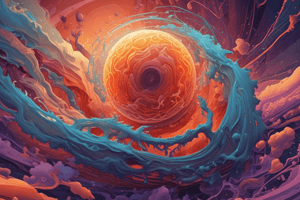Podcast
Questions and Answers
What is the state of matter where atoms are ionized?
What is the state of matter where atoms are ionized?
- Liquid
- Plasma (correct)
- Solid
- Gas
Which state of matter has a fixed shape and volume?
Which state of matter has a fixed shape and volume?
- Plasma
- Liquid
- Solid (correct)
- Gas
What is the process of changing directly from a solid to a gas?
What is the process of changing directly from a solid to a gas?
- Deposition
- Condensation
- Evaporation
- Sublimation (correct)
What is the state of matter where particles are widely spaced and are free to move in any direction?
What is the state of matter where particles are widely spaced and are free to move in any direction?
What is the process of changing from a gas to a liquid?
What is the process of changing from a gas to a liquid?
What is an example of a solid?
What is an example of a solid?
What is the process of changing from a solid to a liquid?
What is the process of changing from a solid to a liquid?
Flashcards are hidden until you start studying
Study Notes
States of Matter
Solids
- Have a fixed shape and volume
- Particles are closely packed and have a regular arrangement
- Particles vibrate in place but do not change position
- Examples: rocks, metals, ice
Liquids
- Take the shape of their container and have a fixed volume
- Particles are close together but are free to move past each other
- Particles have some freedom of motion but are still attracted to each other
- Examples: water, oil, juice
Gases
- Have neither a fixed shape nor a fixed volume
- Particles are widely spaced and are free to move in any direction
- Particles have a lot of freedom of motion and are not strongly attracted to each other
- Examples: air, helium, oxygen
Plasma
- A high-energy state of matter where atoms are ionized
- Particles are broken down into ions and free electrons
- Found naturally in stars and lightning
- Examples: neon signs, plasma TVs
Change of State
- Melting: solid to liquid (e.g., ice to water)
- Freezing: liquid to solid (e.g., water to ice)
- Evaporation: liquid to gas (e.g., water to water vapor)
- Condensation: gas to liquid (e.g., water vapor to water)
- Sublimation: solid to gas (e.g., dry ice to carbon dioxide)
- Deposition: gas to solid (e.g., carbon dioxide to dry ice)
States of Matter
Solids
- Possess a fixed shape and volume due to closely packed particles with a regular arrangement
- Particles vibrate in place, but their positions remain constant
- Examples of solids include rocks, metals, and ice
Liquids
- Take the shape of their container, but retain a fixed volume
- Particles are close together, allowing them to move past each other
- Particles have some freedom of motion, but are still attracted to each other
- Examples of liquids include water, oil, and juice
Gases
- Neither a fixed shape nor a fixed volume, allowing them to expand and contract freely
- Particles are widely spaced, enabling them to move in any direction
- Particles have a high degree of freedom of motion and are not strongly attracted to each other
- Examples of gases include air, helium, and oxygen
Plasma
- A high-energy state of matter characterized by ionized atoms
- Consists of ions and free electrons
- Naturally found in high-temperature environments such as stars and lightning
- Examples of plasma include neon signs and plasma TVs
Change of State
Phase Transitions
- Melting: the process of a solid changing to a liquid, increasing temperature (e.g., ice to water)
- Freezing: the process of a liquid changing to a solid, decreasing temperature (e.g., water to ice)
- Evaporation: the process of a liquid changing to a gas, increasing temperature (e.g., water to water vapor)
- Condensation: the process of a gas changing to a liquid, decreasing temperature (e.g., water vapor to water)
- Sublimation: the process of a solid changing directly to a gas, increasing temperature (e.g., dry ice to carbon dioxide)
- Deposition: the process of a gas changing directly to a solid, decreasing temperature (e.g., carbon dioxide to dry ice)
Studying That Suits You
Use AI to generate personalized quizzes and flashcards to suit your learning preferences.




